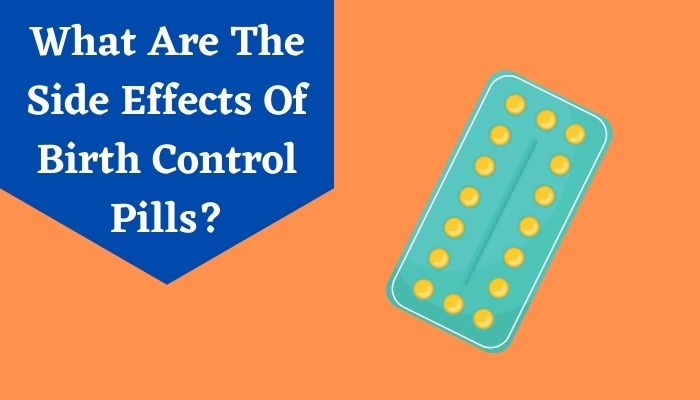Raj and Shalini are a newly-married couple. They want to enjoy their married life for 2 to 3 years, so they thought of family planning. They considered many options to avoid unwanted pregnancy and finally consulted a gynecologist, who prescribed birth control pills to Shalini. Like, any other woman, Shalini was hesitant to start with these pills because she heard about many side effects of birth control pills. Her doctor answered all her queries and encouraged her to start with these pills stating the surprising health benefits of birth control pills, without hiding some minor side effects she may experience.

Let us help you understand the common side effects of birth control pills and what are the risk factors associated with these oral contraceptive pills.
What Are Birth Control Pills?
As the name suggests, birth control pills are pills formulated to control the birth of a baby. These are oral contraceptives containing hormones that prevent releasing of eggs from a woman’s ovaries during ovulation. Besides, these pills thicken the cervical mucus, which then acts as a wall between any eggs if released and the sperm, thereby reducing the chances to conceive.What are the types of birth control pills?
Birth control comes in two types: combination pills and progestin-only pills. Both types of birth control contain hormones that prevent pregnancy. Let’s take a look at these types in detail:Combination pills contain estrogen and progestin. They prevent pregnancy by actively stopping ovulation. This type of birth control is the most commonly sold type. Combination pills offer more choice and are more accessible. They are also considered more effective than their progestin-only counterpart. This type may not be suitable for everyone, especially those who have a history of blood clots.
Progestin-only birth control pills only contain progestin. They thicken the cervical mucus and block sperm. They can also prevent ovulation. Progestin-only pills are ideal for breastfeeding women or those who cannot take estrogen due to a history of blood clots. Progestin-only pills are most effective if taken at the same time every day.
How effective is the pill?
Depending on the type of birth control, how you take it, and your overall health, the effectiveness of the pills changes. The pill is generally considered to be 99% effective. You must adhere to taking it every day at the same time, without skipping a dose. If you forget to take your pill at the scheduled time, your chances of pregnancy go up if you are regularly sexually active. Each year, 9 out of every 100 people experience an unintended pregnancy while on the pill.How does the birth control pill work?
Birth control pills have hormones in them. They prevent pregnancy by blocking conception. They can actively change your uterus in a way that it doesn’t support pregnancy. If you stop taking the pills, your uterus health will go back to the way it was, increasing your chance of pregnancy.Birth control pills work by stopping or reducing ovulation, thickening the cervical mucus, or thinning the lining of your uterus so a fertilized egg does not attach.
How to Take Birth Control Pills?
The traditional pack of oral contraceptives contains 21 pills for 21 days, which is supposed to be started from the fifth day of your last menstrual cycle or LMP. Then the woman needs to take a break for 1 week or 7 days, during which she is supposed to have her periods. Then, again she can start another pack of birth control bills, or as prescribed by her gynecologist. Also Read: Is It Possible to See Signs of Pregnancy While on Birth Control?7 Common Side Effects of Birth Control Pills
Let us understand mini pill side effects one-by-one1. Nausea and Headaches
Nausea and headaches are the most common side effects of using oral contraceptive pills. This is due to the change in the estrogen and progesterone hormones in a female’s body.
These symptoms may vary depending on the type of pill and its dosage taken. Headache may also lead to migraine in some ladies who are also suffering from PMS. Also Read: Premenstrual Syndrome Explained: PMS Symptoms and Treatment
2. Sudden Weight Gain
 When talking about the main side effects of birth control pills, one may not ignore mentioning that some women experience weight gain due to these pills.
When talking about the main side effects of birth control pills, one may not ignore mentioning that some women experience weight gain due to these pills.
3. Mood Swings
Third side effect of using birth control pills is that it may lead to mood swings and change a woman’s emotions.
This happens due to changes in the hormonal levels due to these pills.
4. Breast Tenderness
A number of women who take oral contraceptives also experience pain and tenderness in their breasts. There is a feeling of heaviness in their breast that reaches out to their armpit and upper arms. This, however, is a mild side effect of this pill.5. Irregular Periods or Missing Periods
Another common side effect of taking birth control pills is that it may lead to irregular or missed periods.
This again is due to the hormonal changes that occur because of these pills. Besides a birth control pill, sometimes there may be some other reasons for a missed period like traveling, illness, stress, and thyroid imbalance.
6. Between the Periods Spotting
Spotting between the periods is also a common issue experienced by many women in the first three or four months of using birth control pills. However, this side-effect subsides gradually once the body gets used to these pills. Some women may even experience spotting between the periods if they miss a dose of these pills.7. Vaginal Discharge
Another common side-effect of using birth control pills is frequent vaginal discharge.
Women may experience either an increase or decrease in vaginal discharge when on these pills.
8. Reduction in Libido
Last of the birth control side effects of these pills is that they may reduce your sex drive or libido. This happens due to hormonal changes because these pills alter your hormones to prevent an unwanted pregnancy.Other Risk Factors of Birth Control Pills
Besides the above-mentioned side effects of birth control pills, there are some other risk factors associated with these pills on your health too. No matter, which brands your doctor may suggest you, some of the risk factors on health using these pills are:- Stroke
- Heart Attack
- Blood Clotting
- High Blood Pressure
- Gallbladder Disease
- Liver Cancer
Long-Term Side Effects of Mini Pill
Doctors do recommend taking these pills for the long term, but some studies have revealed that these may lead to some types of cancer. As per the American Cancer Society, long-term use of birth control pills may lead to cervical cancer and even breast cancer in women. At the same time, some other studies revealed that long-term use of birth control pills also reduces the chances of certain cancers like ovarian cancer, endometrial cancer, and colorectal cancer.Top 10 Health Benefits of Using Birth Control Pills
You will be astonished to note that there are plenty of health benefits of using birth control pills. Let’s have a look at these benefits:- Reduces Menstrual Cramps
- Reduces Facial Hair Growth
- Reduces Endometriosis Symptoms
- Reduces PCOS Symptoms
- Prevents Endometrial Cancer
- Prevents Ovarian Cancer
- Prevents Ovarian Cysts
- Prevents Pelvic Inflammatory Disease of PID
- Prevents Iron Deficiency and Anemia
- Controls Menstrual Bleeding Issues


